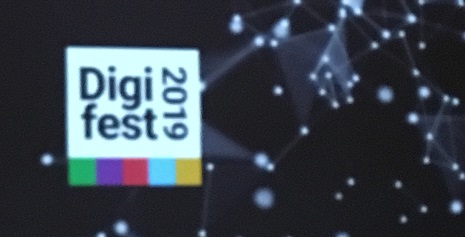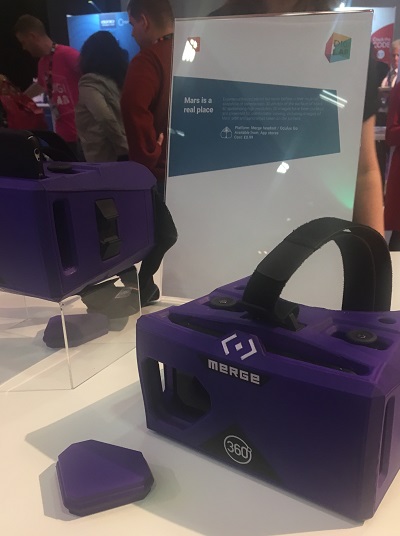
Digifest 2019 focused largely on the changing nature of education in today’s world and the need to ensure that students are being successfully prepared for a transforming world of work. I found my two days there inspiring and challenging. I appreciated having the time out to reflect on what education might one day look like through the Natalie 4.0 virtual reality experience. But, more than that, I loved seeing educators and learning technologists with a passion for what they are doing getting up and telling us about how they are working through some of their challenges and finding solutions.
The whole thing kicked off with an impressive dance spectacle which brought together artists performing across Europe thanks to the power of the Janet network. It was certainly an original start to the event!
Highlights of the conference for me included:
- My first ever VR experience being a student in the future. Natalie 4.0 enabled delegates to see how a student of the future might experience permanent connectivity, learn with a virtual teacher accompanied by virtual students from other countries and enjoy virtual field trips. This was an awesome way to demonstrate how students might one day learn.

2. I attended a great session led by staff from Milton Keynes College. They modelled how they would normally run a training session using an active blended learning approach, getting the group to reflect on the meaning of metacognition and it’s role in teaching and learning. They explained how they adopt this active learning approach in all their training sessions in order to provide a clear model for staff.
Within the session we used a range of apps to perform tasks in groups with each member of the group having been assigned a clear role. A self-paced quiz delivered through Quizziz got the group engaged from the beginning. I left the session thinking that I’d like to take a similar approach in some of my training.
3. Teams is being used more and more at York St John so I was really happy when Dale Munday started to talk about his use of Teams as an alternative to a ‘regular’ VLE. With the title ‘Not a VLE but a virtual learning environment’, I hadn’t been quite sure what to expect but was pleasantly surprised! He talked about how the flexibility of the tool enables students to collaborate more easily and showed us a number of the apps which integrate into Teams which he has made use of.
It was interesting to learn that while Teams is working well it is nevertheless still being used alongside Moodle, a more conventional VLE. And although the flexibility of Teams is one of its key advantages, Dale talked us through the upcoming introduction of a template-type baseline in order to help ensure a consistent student experience where this VLE approach is being used.
4. A hands-on workshop from the University of Lancaster team showcased the great work being carried out in student and staff digital skills development there. I liked their active approach to the session starting off with a series of video case studies which gave us a good picture of what they’re doing and the impact their team is having. They have a wide selection of online resources – something our TEL team is really keen to build up. They also offer a self assessment tool to help students and staff to better focus their training – similar to the JISC Discovery tool available to YSJ staff and students. They offer a Digital Skills certificate to those completing digital training and the great thing is that this appears on student transcripts so that their hard work is fully recognised. I took lots of ideas away from this session about how we could offer more as a TEL team.
5. There was an inspirational session led by Kerensa Jennings from iDea, an organisation who are providing lots of free online training options. Four speakers gave examples of how these training resources are being used from army cadet training to business upskilling, higher education careers support and being promoted by local councils to help develop digital literacy amongst the general public.
Their bronze level courses can be taken separately and consist of short bite size training sessions. The silver level resources consist of gamified learning experiences taking you from beginner to experienced level. The great thing is that iDea’s online courses have now been mapped to the JISC Discovery tool so YSJ staff and students can take the survey and then be directed to the courses most relevant to them.
A few key takeaways from keynote Dave Coplin:
He commented on how people are more open to technology now. But he pointed out that people aren’t interested in how technology works, they just want it to work. It strikes me that this can be problematic sometimes in higher education. Academic staff want the technology to work to meet their teaching needs. They don’t normally have time to be interested in how it works.
He explained how in his view the top three skills that we should be helping students to develop are creativity, empathy and accountability. While I’m not sure I agree, it certainly made me think. Asking questions like this takes you back to the root of what you are doing and why you are doing it.
This was backed up by Dave’s elephant powder story, which it seems he’s been telling for years. He asks you to question why you are doing things and to stop doing things that serve no purpose just because you’ve been doing them forever!
Dave is walking through London at 6:00 one morning. The streets are all quiet except for one man walking down the middle of the road. Every now and then he crouches down and places some white powder along the middle of the road. Intrigued, Dave approaches the man and asks what he is doing.
The man explains he is sprinkling elephant powder and that he does it every morning. Dave is confused. The man continues “it keeps the elephants away”.
Dave, still puzzled…….”But there are no elephants in London?!”.
In agreement the man exclaims, “I know! Been using it for years, great stuff isn’t it!”.

You can access some of the presentation recordings and slides on the Digifest 2019 programme page. If you’d like to talk further about any of the ideas or resources in this post, please get in touch with the TEL team.

0 responses on "Digifest 2019"